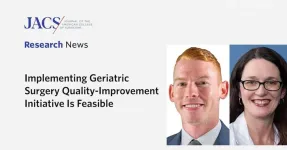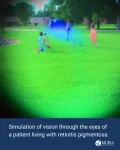(Press-News.org) Key takeaways
Feasible for small and large hospitals: Pilot institutions in the study included community hospitals and academic medical centers representing every region of the United States.
Geriatric surgical patients are a growing population: American College of Surgeons standards for geriatric surgery address a growing population that most hospitals serve.
Standards help address barriers to implementation: ACS geriatric surgery standards help hospitals identify and address challenges to providing optimal care, including staffing, manpower, and lack of geriatricians in many hospitals.
CHICAGO: A national pilot program designed to improve outcomes for elderly surgical patients is scalable and can be implemented in a wide range of hospital types—from community hospitals to urban academic medical centers, according to a study published this week in the Journal of the American College of Surgeons (JACS).
The study evaluated the implementation of standards developed by the American College of Surgeons (ACS) Coalition for Quality in Geriatric Surgery (CQGS), a collective of 58 organizations across a variety of medical disciplines, including surgery, geriatrics, nursing, and pharmacy. This Coalition led to the development of the ACS Geriatric Surgery Verification Program (GSV), launched in July 2019.
“We were able to demonstrate the feasibility of implementing these geriatric standards in eight different hospitals across the country that had variable sizes and geographic backgrounds and resources,” said corresponding author Xane Peters, MD, a clinical scholar in the Division of Research and Optimal Patient Care with the ACS Geriatric Surgery Verification Program and a general surgery resident at Loyola University Medical Center in Maywood, Illinois. “This study highlights the value of a geriatric-oriented surgery quality program. The number of older adults in the United States is growing every year and a program like this is valuable because it targets a part of the population that’s treated in the vast majority of hospitals across the U.S.”
The hospitals selected for the study ranged in size from about 160 beds to more than 1,000 beds. They represented every region of the U.S., and included university-associated programs, community hospitals, and government-affiliated centers.
“Our goal was to bring together a diverse group of stakeholders that were interested in optimizing care for older adults,” said senior author Marcia M. Russell, MD, FACS, vice chair of the ACS Committee on Geriatric Surgery and an associate professor of surgery at the David Geffen School of Medicine at UCLA. “The end goal was to identify the optimal standards for these patients and use those to develop a quality improvement program.”
In 2016, CQGS drafted 308 preliminary standards for geriatric surgery, winnowing that to 30 final standards for implementation at the pilot sites. In this study, researchers aimed to determine how well the selected standards could be implemented in pilot sites and to identify barriers and best practices in their implementation so that the standards could be further refined if needed.
“Virtually every hospital will have to address how it cares for the growing older population in its community. The GSV program gives hospitals a roadmap about how to deliver the best surgical care for older patients to achieve their care goal,” said Clifford Y. Ko, MD, MS, MSHS, FACS, FASCRS, Director of the ACS Division of Research and Optimal Patient Care. “This study shows that it is feasible for all hospitals to implement this program whether they are big or small, urban or rural. The GSV program not only leads to better outcomes for patients, but it also helps hospitals deliver optimal care more cost-effectively.”
Study details and results
The study grouped the 30 standards into six different “chapters,” or broad categories, and rated them in terms of compliance level at each hospital. The categories with the highest compliance were:
Program Management
Immediate Preoperative and Intraoperative Care
Postoperative Clinical Care
The categories with the lowest compliance were:
Goals and Decision-Making
Preoperative Optimization (practices for preparing patients for surgery)
Transitions of Care
The study identified barriers and challenges to the implementation of the quality standards, which helped in the development of the tools and resources available to hospitals participating in the ACS GSV Program to overcome these barriers.
The most commonly cited barriers were workflow and staffing limitations, which the authors note may have become more challenging since the COVID-19 pandemic. “The ACS GSV program offers a lot of educational resources and best practices, some of which are shared between hospitals, so that institutions that are interested in implementing these programs can make use of things that have been done by other similar institutions so they’re not reinventing the wheel,” Dr. Peters said.
Other barriers relate to educating providers about caring for geriatric patients, which led the CQGS to develop educational materials. “There are not enough geriatricians in the U.S. to care for all older adults,” Dr. Russell said. “Our program identifies some ways to adapt. If you don’t have a geriatrician at your hospital, you can still put these standards into place.”
“These findings provide evidence of real-life implementation by these eight very different hospitals and demonstrate that hospitals can put these geriatric standards into play,” Dr. Russell added. “Hospitals were able to implement the standards in about six months, which is a pretty rapid timeline, and they had high levels of both full and partial compliance.”
Study co-authors are Meixi Ma, MD, MS; Lindsey M. Zhang, MD, MS; Kataryna Christensen, BS; and Clifford Y. Ko, MD, MS, MSHS, FACS, FASCRS, with the American College of Surgeons, Division of Research and Optimal Patient Care, Chicago; Melissa Hornor, MD, MS, of Loyola University Medical Center, Department of Surgery; JoAnn Coleman, DNP, ANP, ACNP, AOCN, and Mark Katlic, MD, MMM, FACS, of Sinai Hospital, Sinai Center for Geriatric Surgery, Baltimore; Emily Finlayson, MD, MS, University of California San Francisco (UCSF), Department of Surgery; Kellie L. Flood, MD, of the University of Alabama at Birmingham Medical Center (UABMC), Department of Medicine, Division of Geriatrics, Hospice and Palliative Care; Sandhya Lagoo-Deenadayalan, MD, PhD, FACS, of Duke University, Department of Surgery, Durham, N.C.; Thomas N. Robinson, MD, MS, FACS, University of Colorado, Department of Surgery, Aurora; Ronnie A. Rosenthal, MD, MS, FACS, of Yale University, Department of Surgery, New Haven, Conn.; and Victoria L. Tang, MD, MAS, of the UCSF, Division of Geriatrics, Department of Medicine. Dr. Ma is also with UABMC, Department of Surgery; Dr. Zhang is also with the University of Chicago Medical Center, Department of Surgery. Dr. Ko is also with UCLA, Department of Surgery.
The study was supported by a grant from the John A. Hartford Foundation. Drs. Peters, Ma and Zhang were supported with funding from the foundation. The remaining authors have no relevant disclosures to report.
This article is published as an article in press on the JACS website.
Citation: Multi-Site Implementation of an American College of Surgeons Geriatric Surgery Quality Improvement Initiative. Journal of American College of Surgeons. DOI: 10.1097/XCS.0000000000000723.
# # #
About the American College of Surgeons
The American College of Surgeons is a scientific and educational organization of surgeons that was founded in 1913 to raise the standards of surgical practice and improve the quality of care for all surgical patients. The College is dedicated to the ethical and competent practice of surgery. Its achievements have significantly influenced the course of scientific surgery in America and have established it as an important advocate for all surgical patients. The College has more than 84,000 members and is the largest organization of surgeons in the world. “FACS” designates a surgeon is a Fellow of the American College of Surgeons.
The Journal of the American College of Surgeons (JACS) is the official scientific journal of ACS. Each month, JACS publishes peer-reviewed original contributions on all aspects of surgery, with the goal of providing its readership the highest quality rapid retrieval of information relevant to surgeons.
END
Improving geriatric surgical quality is feasible for a wide range of hospitals
American College of Surgeons quality program aimed at older adults is scalable, pilot study finds
2023-04-27
ELSE PRESS RELEASES FROM THIS DATE:
Scripps Research preclinical study finds insomnia drug blocks oxycodone relapse
2023-04-27
LA JOLLA, CA—The insomnia drug suvorexant (Belsomra®) might be an effective treatment for opioid use disorder, according to a preclinical study from Scripps Research.
In the study, published April 27, 2023, in Frontiers in Pharmacology, the Scripps Research scientists found that suvorexant reduced prescription opioid intake and helped protect against relapse in rats modeling opioid use disorder (OUD). If the results translate to humans in clinical trials, the insomnia drug could offer a promising approach for the millions of people who have OUD.
“Our results suggest that repurposing suvorexant could be a good strategy for reducing drug intake and blocking relapse in cases ...
Calling all canines: Help sniff out the dangerous spotted lanternfly
2023-04-27
From New York to North Carolina and as far west as Illinois, the invasive spotted lanternfly is causing chaos in many states where agricultural and forestry industries are essential to the economy. It has been estimated that crops and forest production losses caused by insects and pathogens are close to $40 billion a year.
Spotted laternflies, native to mainland China, prey upon 70-plus host plant species, stealing their nutrients with their piercing snouts, called stylets. They are often characterized as “hitchhikers” for their ability to move ...
AGS honors expert & emerging geriatrics leaders at 2023 Annual Scientific Meeting (#AGS23)
2023-04-27
New York (April 27, 2023) – The American Geriatrics Society (AGS) annually honors researchers, clinicians, educators, and emerging health professionals who have made outstanding contributions to high-quality, person-centered care for older adults. This year’s award recipients include 19 leaders representing the breadth of medical disciplines championing care for us all as we age.
Clinical Student Research Award
Matthew Ryan Cosmai
Clinician of the Year Award
Shelley R. McDonald, DO, PhD
David H. Solomon Memorial Public Service Award
Alan Lazaroff, ...
Plastic particles themselves, not just chemical additives, can alter sex hormones
2023-04-27
Amid rising evidence that additives designed to improve plastics also disrupt sex hormones, a Rutgers laboratory trial shows that plastic itself can do likewise when inhaled at moderate levels.
Previous studies focused on chemicals such as bisphenol-A (BPA) that make plastics stiffer or more flexible. These findings spurred ongoing efforts to find safer plastic additives.
The Rutgers study showed that microscale and nanoscale particles (MNPs) of polyamide, a common plastic better known as nylon, produced endocrine-disrupting ...
ATS 2023 International Conference announces late-breaking clinical trials
2023-04-27
April 27, 2023 – One of the most highly-anticipated events at the ATS 2023 International Conference, which kicks off May 19, is the “Breaking News: Clinical Trial Results in Pulmonary Medicine.” Taking place on Monday, May 22, the series of presentations will focus on the latest regarding COPD and asthma treatment.
Register now to hear these presentations live. A question-and-answer period will follow all presentations:
Seralutinib Treatment in Adult Subjects with Pulmonary Arterial Hypertension: Results from the TORREY Study
Effect of Ensifentrine, a Novel PDE3 and PDE4 Inhibitor, on Lung Function, Symptoms and Exacerbations in Patients with COPD: ...
In yeast, altering genetic circuitry that controls how an aging cell dies enhances longevity
2023-04-27
Engineering a synthetic oscillator that cycles between the two deterioration pathways that lead to cell death can slow aging in yeast cells, increasing their longevity by more than 80%, a new study reports. The findings represent a proof-of-concept example of using synthetic biology to reprogram the cellular aging process. Given that the underlying aging pathways are conserved, the findings may one day enable the design of synthetic gene circuits that promote longevity in more complex organisms. Cellular aging is a fundamental and complex biological process ...
Backpropagation training achieved in photonic neural network
2023-04-27
Neural networks made from photonic chips can be trained using on-chip backpropagation – the most widely used approach to training neural networks, according to a new study. The findings pave the way toward developing optically driven and energy-efficient machine learning technologies that reduce both the carbon footprint and costs of AI computation. Neural networks (NNs) are an approach to machine learning conceptually inspired by the biology of the brain and have become a mainstay in various modern scientific and commercial AI technologies, including the widely discussed ChatGPT architectures. ...
Comparing the genes of 240 species of mammals—and one famous dog—offers a powerful new approach for understanding biology and evolutionary history
2023-04-27
Ever since scientists first read the complete genetic codes of creatures like fruit flies and humans more than two decades ago, the field of genomics has promised major leaps forward in understanding basic questions in biology.
And now comes a major installment of that promise. In what Howard Hughes Medical Institute Investigator and HHMI Professor Beth Shapiro calls a treasure trove of research, more than 150 researchers from 50 institutions are publishing 11 different papers in the April 28, 2023, issue of Science. The research brings new insights from the Zoonomia Project, an unprecedented collaborative effort led by Elinor Karlsson, director of the Vertebrate Genomics ...
Pulling the plug on viral infections: CRISPR isn’t just about cutting
2023-04-27
CRISPR claimed scientific fame for its ability to quickly and accurately edit genes. But, at the core, CRISPR systems are immune systems that help bacteria protect themselves from viruses by targeting and destroying viral DNA and RNA. A new study published in Science reveals a previously unrecognized player in one such system – a membrane protein that enhances anti-viral defense – simultaneously broadening our understanding of and raising more questions related to the complexities of CRISPR.
Uncovering New Clues about CRISPR
CRISPR systems consist of two major components – a guide RNA that targets a specific viral DNA or RNA sequence and a Cas enzyme ...
Unraveling the mathematics behind wiggly worm knots
2023-04-27
For millennia, humans have used knots for all kinds of reasons — to tie rope, braid hair, or weave fabrics. But there are organisms that are better at tying knots and far superior — and faster — at untangling them.
Tiny California blackworms intricately tangle themselves by the thousands to form ball-shaped blobs that allow them to execute a wide range of biological functions. But, most striking of all, while the worms tangle over a period of several minutes, they can untangle in mere milliseconds, escaping at the first sign of a threat from a predator.
Saad Bhamla, assistant ...
LAST 30 PRESS RELEASES:
For solar power to truly provide affordable energy access, we need to deploy it better
Middle-aged men are most vulnerable to faster aging due to ‘forever chemicals’
Starving cancer: Nutrient deprivation effects on synovial sarcoma
Speaking from the heart: Study identifies key concerns of parenting with an early-onset cardiovascular condition
From the Late Bronze Age to today - Old Irish Goat carries 3,000 years of Irish history
Emerging class of antibiotics to tackle global tuberculosis crisis
Researchers create distortion-resistant energy materials to improve lithium-ion batteries
Scientists create the most detailed molecular map to date of the developing Down syndrome brain
Nutrient uptake gets to the root of roots
Aspirin not a quick fix for preventing bowel cancer
HPV vaccination provides “sustained protection” against cervical cancer
Many post-authorization studies fail to comply with public disclosure rules
GLP-1 drugs combined with healthy lifestyle habits linked with reduced cardiovascular risk among diabetes patients
Solved: New analysis of Apollo Moon samples finally settles debate about lunar magnetic field
University of Birmingham to host national computing center
Play nicely: Children who are not friends connect better through play when given a goal
Surviving the extreme temperatures of the climate crisis calls for a revolution in home and building design
The wild can be ‘death trap’ for rescued animals
New research: Nighttime road traffic noise stresses the heart and blood vessels
Meningococcal B vaccination does not reduce gonorrhoea, trial results show
AAO-HNSF awarded grant to advance age-friendly care in otolaryngology through national initiative
Eight years running: Newsweek names Mayo Clinic ‘World’s Best Hospital’
Coffee waste turned into clean air solution: researchers develop sustainable catalyst to remove toxic hydrogen sulfide
Scientists uncover how engineered biochar and microbes work together to boost plant-based cleanup of cadmium-polluted soils
Engineered biochar could unlock more effective and scalable solutions for soil and water pollution
Differing immune responses in infants may explain increased severity of RSV over SARS-CoV-2
The invisible hand of climate change: How extreme heat dictates who is born
Surprising culprit leads to chronic rejection of transplanted lungs, hearts
Study explains how ketogenic diets prevent seizures
New approach to qualifying nuclear reactor components rolling out this year
[Press-News.org] Improving geriatric surgical quality is feasible for a wide range of hospitalsAmerican College of Surgeons quality program aimed at older adults is scalable, pilot study finds





